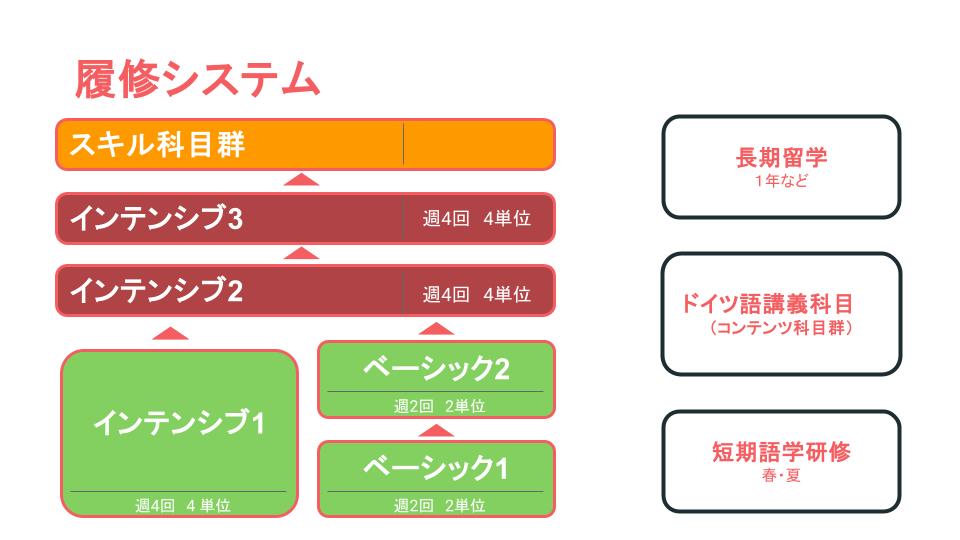German at the SFC offers four different courses: intensive, basic, skills and content (lecture courses).
Keio University currently has more than 30 exchange partners in Germany, Austria and Switzerland, and has an extensive system for studying at these universities.
Why don’t you all take advantage of this opportunity to really ‘use’ German?
Timetables for each course can be found here. You can also view the syllabus by clicking on the name of the course.

Intensive Course
This makes it the ideal course for those who want to learn German in an intensive way. There are three courses, Intensive 1-3 (known as G1, G2 and G3), with Intensive 1 being aimed at absolute beginners. In the Intensive course, students attend four lessons per week, utilizing textbooks originally developed by the SFC German Lab and materials based on these textbooks.
The SFC German places great emphasis on the ability to actively communicate in German, so reading classic works of literature is not part of the Intensive course, at least not at the SFC. The emphasis is on learning to communicate as much as possible in German, persuade others and build consensus, using the language and vocabulary you have at the time.
By the end of Intensive 3, you will be able to use the language in all situations and exchange opinions on topics related to your field of expertise, such as politics, economics, society, history and culture. You will also acquire sufficient German language skills to participate in short-term study abroad programmes at universities and language schools in German-speaking countries.
In parallel with Intensive 3, the SFC’s German language teaching also includes ‘Tandem’. Tandem’ originally means a bicycle for two people, and the our German language teaching programme has introduced “Tandem” in cooperation with German-speaking universities. Students are teamed up with native German-speaking students and mutually brush up on each other’s language of study (German and Japanese).
Basic Course
This course is for those who want to acquire German language skills over time. The Intensive Course has four lessons per week, whereas the Basic Course has two lessons per week. This course is recommended for people who find it difficult to attend four German lessons per week due to other commitments.
As with the Intensive Course, the SFC German Language Laboratory has developed its own textbooks and materials based on these textbooks, which are used in two classes per week. This means that completion of Basic 1 is equivalent to completion of the first half of Intensive 1. Upon completion of Basic 1, students can move on to Basic 2. Basic 2 corresponds to the second half of Intensive 1. Those who have completed Basic 2 and hope to continue their German language studies can move on to Intensive 2.
Skill
These courses are an extension of the Intensive courses and can in principle only be taken if you have already completed Intensive 3*. The aim is to go beyond Intensive 3 by training the four skills of reading, writing, speaking and listening, while at the same time improving communication skills and strategies (commonly known as G4 and G5**). In addition, there are a variety of other courses such as discussion and presentation skills, essay writing, reading strategies, preparation for various examinations such as the Goethe-Institut, Austrian government examinations and the German Language Proficiency Test (German Proficiency Test), and courses to prepare for short-term study abroad (some courses may not be offered in certain semesters).
* Courses are also available to those who have passed the Foreign Language Certificate Examination. As an exception, some courses, such as the Preparation for Overseas Study course, can be taken in parallel with the Intensive or Basic courses.
** G4 and G5 are both offered twice a week. It is recommended to take them as a set of two classes.
Contents (Lecture Subject)
The course is a mixture of lectures and seminars and is intended for students who have completed an intensive course*. As a rule, the classes are taught in German, as students not only learn German, but also discuss, think and learn about various subjects ‘in’ German. Some courses include distance learning with German universities. There are various types of courses, such as ‘Media Studies’, ‘Area Studies’, ‘Linguistics’, ‘Social Studies’, ‘Cultural Studies’ and ‘Japanese-German Social Studies’ (some courses may not be offered in certain semesters). Content can also be taken as ‘subject of language communication courses’ as well as ‘advanced subject’.
* Courses are also available to those who have passed the Foreign Language Certificate Examination.
About the certification test
SIf you fall into any of the following categories, please take the Foreign Language Proficiency Certification Test conducted before classes begin in April or in October. The certification test assesses both writing and speaking skills at each level. If you hold certifications such as those from the Goethe-Institut or the German Language Proficiency Test (Dokken), please notify us in advance.
- Those who have already studied German in high school or elsewhere and wish to start from an intermediate level
- Those who wish to skip levels
Those who are certified can start from higher-level classes, such as Intensive 2 or 3, Basic 2, Skill, or Content (lecture courses). Even non-freshmen can take the proficiency test and skip levels, for example, advancing from Intensive 1 to 3 or from Basic 1 to Intensive 2.
For any other questions, please contact the German Lab (Building λ, Room 410, doiken [at] sfc.keio.ac.jp).For further questions, please contact the German Language Laboratory (λ410, doiken [at] sfc.keio.ac.jp).
